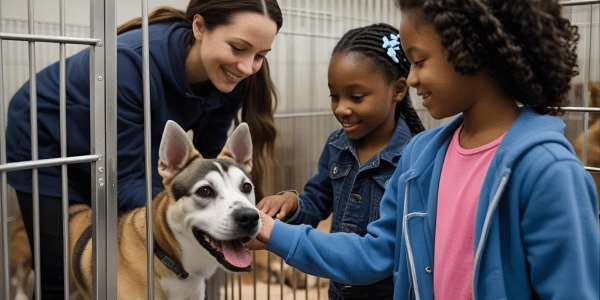Bringing a dog into your home is one of the most rewarding decisions a family can make—but it’s not one to take lightly. From size and temperament to grooming needs and energy levels, choosing the right dog for your family requires a blend of thoughtful planning, honest self-assessment, and a bit of canine chemistry.
This comprehensive guide walks you through every step of selecting the perfect dog to match your family’s lifestyle, helping ensure a lifelong bond between you and your four-legged friend.
Why Choosing the Right Dog Matters
Before we dive into breeds, shelters, and puppy vs. rescue debates, let’s highlight the real impact of the right match. Dogs are not just pets—they become family. A mismatch in energy, needs, or temperament can lead to stress, behavioral issues, and even heartbreak.
In 2023, 3.1 million dogs entered U.S. animal shelters. Of those, a large portion were surrendered due to behavioral issues or unmet expectations. Proper research at the outset can prevent future disappointment—for both humans and pups.
We cover the full adoption process in our Adopt a Dog Complete Guide.
Step 1: Evaluate Your Family’s Lifestyle
Before looking at dog breeds or adoption centers, start by taking an honest look at your household’s daily rhythm. Consider the following:
1. Activity Level
- Do you love long hikes and park visits?
- Or do you prefer cozy weekends at home?
Active families may thrive with high-energy breeds like a Labrador Retriever or Australian Shepherd, while homebodies may be better suited for a Cavalier King Charles Spaniel or Shih Tzu.
2. Home Environment
- Do you live in an apartment, suburb, or rural area?
- Is your yard fenced?
- Are pets allowed where you live?
A Great Dane may sound cool, but it’s a no-go in a tiny studio. Conversely, a small dog with a big bark might not work in a close-quarters apartment complex.
3. Time Commitment
Puppies require significant training and time. Rescue dogs might need patience and rehabilitation. Evaluate how much time your family can realistically devote to:
- Daily walks
- Feeding and grooming
- Training and socialization
4. Children and Age Factors
Young kids may be unpredictable and need a dog that tolerates rough love. Some of the best family-friendly breeds include:
- Golden Retrievers
- Beagles
- Boxers
Avoid breeds known for nervousness or aggression unless your children are older and dog-savvy.
Step 2: Consider Dog Size and Age
Small, Medium, or Large?
| Size | Ideal For | Considerations |
| Small | Apartments, seniors, city life | May be delicate around young children |
| Medium | Suburban homes, active families | Balanced energy, easier to train |
| Large | Large homes, active outdoorsy folks | Needs space, can be more expensive to feed & care for |
Puppy vs. Adult Dog
Puppy Pros:
- Can be trained from scratch
- Cute bonding moments
Puppy Cons:
- House training takes weeks or months
- Chewing, crying, teething phase
Adult Dog Pros:
- Temperament is more predictable
- May already be house-trained
Adult Dog Cons:
- Potential baggage from past owners
- May take longer to bond or adjust
Step 3: Choose a Breed That Matches Your Life (or a Mix That Does!)
Each breed comes with unique traits. Don’t choose a dog based on looks or trends (we’re looking at you, Doodle craze)—focus on behavior and needs.
Here’s a breakdown of popular family-friendly breeds and what makes them great:
| Breed | Size | Temperament | Grooming | Energy Level | Best For |
| Labrador Retriever | Large | Friendly, loyal | Moderate | High | Active families |
| Golden Retriever | Large | Gentle, smart | High (shedding) | High | Families with kids |
| Cavalier King Charles Spaniel | Small | Loving, quiet | Moderate | Medium | Apartment dwellers |
| Boxer | Medium | Playful, protective | Low | High | Energetic homes |
| Poodle (Mini or Standard) | Varies | Intelligent, hypoallergenic | High | Medium–High | Allergy-prone households |
| Beagle | Medium | Curious, sturdy | Low | Medium | Outdoorsy families |
Don’t rule out mixed breeds! Many mutts combine the best of both worlds, and often have fewer health issues. Use Embark or Wisdom Panel to learn more about a dog’s breed mix after adoption.
Step 4: Rescue, Shelter, or Breeder?
Adopting from a Shelter or Rescue
There are thousands of wonderful dogs in shelters waiting for homes. Check out:
Pros:
- Saves a life
- Dogs often vaccinated & microchipped
- Lower cost than breeders
Cons:
- Limited info about history
- May need behavioral support
Buying from a Reputable Breeder
If you’re looking for a specific breed, a responsible breeder is a must. Look for:
- Health clearances
- Clean, humane conditions
- References from past buyers
Avoid puppy mills or online sellers with no physical location. Learn more at the American Kennel Club’s breeder registry.
Step 5: Meet Before You Commit
Never adopt a dog based on a photo alone.
Schedule a meet-and-greet at the shelter or breeder. Bring the entire family—including other pets—to observe how the dog reacts. Watch for:
- Calm curiosity (not panic or fear)
- Interest in play
- Tolerance of petting and handling
Many rescues offer a trial or “foster to adopt” period. Take advantage of this if available—it helps ensure the match sticks.
Step 6: Prepare Your Home and Family
Before bringing your dog home, set up the essentials:
- Crate or bed
- Food and water bowls
- Dog food recommended by your vet
- Toys for chewing and play
- Grooming tools
- ID tag and collar
Create house rules in advance:
- Where will the dog sleep?
- Who walks and feeds them?
- Are there off-limit areas?
Also, schedule a vet visit within the first week. They’ll check for parasites, update vaccines, and discuss spaying/neutering.
Check out our step-by-step guide on How to prepare your home for a rescue dog
Step 7: Commit to Training and Socialization
Training isn’t optional—it’s essential for a happy household.
Enroll in a basic obedience class through your local shelter or community center. You can also use apps like Pupford or GoodPup for remote training.
Early socialization helps your dog become well-adjusted. Introduce them to:
- Other people
- Different environments
- Dogs with good manners
Common Mistakes to Avoid
- Choosing Based on Looks
Instagram-famous dogs don’t always make the best pets. Huskies, for example, are beautiful but notoriously destructive if bored. - Ignoring the Breed’s Purpose
Many breeds were developed for jobs—herding, hunting, guarding. These instincts still exist today. - Skipping the Vet or Behavior Assessment
Before committing, make sure the dog is healthy and temperament-tested.
The Reward: A Lifetime of Love
With the right preparation and mindset, adopting a dog can transform your family. You’ll gain a loyal companion, teach your kids about responsibility and empathy, and experience the unconditional love only a dog can offer.
Whether you adopt a spunky terrier or a mellow retriever, the best dog for your family is the one that fits your life—not your Pinterest board.
Visual: Dog Breed Match Chart
Find Your Match: Quick Breed Selector
| Lifestyle | Best Breeds | Why |
| Active, Hikers | Labrador, Vizsla, Australian Shepherd | Love long walks and need exercise |
| Apartment Living | French Bulldog, Cavalier Spaniel, Dachshund | Lower space needs, quieter |
| Allergies | Poodle, Schnauzer, Maltese | Low-shedding coats |
| Family with Kids | Golden Retriever, Boxer, Beagle | Patient and playful with children |
| First-Time Owners | Cavalier King Charles, Bichon Frise, Labrador | Easy to train and eager to please |
Final Thoughts
There’s no one-size-fits-all dog. The perfect family dog depends on your family—your habits, your space, your energy. Take your time, ask questions, and remember: adopting a dog means committing to their care and happiness for the next 10–15 years.
When done right, the journey is worth every tail wag and wet-nosed nuzzle.






